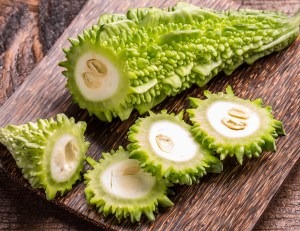Bitter Melon Extract Kills Breast Cancer
July 4, 2016 | Author: Dr. Véronique Desaulniers
Bitter melon (Momordica charantia)
is a vegetable that is common in kitchens all over Asia and is also used for medicinal purposes in China, India, Central America and elsewhere around the world. It has been gaining popularity in the West as well, largely because of its benefits for diabetes. In recent years, studies have shown that bitter melon leaf and fruit extract can also be very effective for cancer healing and prevention, especially for breast cancer.
How Bitter Melon Helps Fight Breast Cancer
Studies show that a substance in bitter melon extract kills breast cancer tumors. A significant development in regards to bitter melon and breast cancer came in 2010 through a joint study published in the journal Cancer Research. Using human mammary cells, the study found that bitter melon extract “significantly decreased proliferation” of cancer cells, inhibited cell growth and even induced apoptosis (programmed cell death) in breast cancer cells.
“Our findings suggest that bitter melon extract modulates several signal transduction pathways, which induces breast cancer cell death,” lead researcher Professor Ratna B. Ray, Ph.D., of St. Louis University, said in a statement.
Fellow study researcher Rajesh Agarwal, Ph.D., of the Department of Pharmaceutical Sciences at the University of Colorado in Denver added: “This study may provide us with one more agent as an extract that could be used against breast cancer if additional studies hold true.”
The 2010 report made headlines when it was published six years ago, yet many questions remained unanswered as to the exact processes through which bitter melon seemed to work on breast cancer cells. Then, in 2013, scientists at China Medical University in Taiwan conducted research based on earlier Chinese findings in which new kinds of glycoside substances were found in Momordica charantia.
Based in part on that earlier research, researchers at the China Medical University discovered that the glycoside DMC found in bitter melon (which has an effect on insulin stabilization and glucose metabolism) also had an effect on breast cancer tumors. According to the researchers, its ability to modulate these reactions on several fronts was also the catalyst for breast cancer cell death.
What Are Glycosides?
Glycosides are a class of molecules found in plants in which a sugar molecule is bonded to a “non-sugar” molecule. Many plants store medicinally important and biochemically active chemicals in the form of inactive glycosides. Bitter melon contains glycosides such as vitamin C, mormordin, carotenoids, flavonoids and polyphenols, all known cancer-fighters and immune system regulators. But how exactly do glycosides work to fight cancer?
Glycosides use certain enzymes to set them in motion so they can do their job. In addition to bitter melon, these plant-fortifying substances can be found in monk fruit, yams, blueberries, cherries, pineapple, flax seeds, apricot seed and hundreds of other plants in nature. Certain types of glycosides, such as those found in monk fruit, stevia, and sweet cherries, are responsible for giving these substances their sweet taste. Besides helping to regulate insulin levels, most importantly, glycosides are antioxidants that help to reduce inflammation in the body (thus fruits such as cherries can help with conditions like arthritis and gout) and protect against cancer.
Bitter Melon is a Powerful Overall Cancer Fighter
In addition to breast cancer, bitter melon has also been shown to be effective on other forms of cancer as well. A 2015 study conducted by the Skaggs School of Pharmacy and Pharmaceutical Sciences at the University of Colorado Anschutz Medical Campus discovered that bitter melon juice (BMJ) decreased cellular communication within pancreatic cancer cells. Most forms of pancreatic cancer have been known to be resistant to conventional chemotherapy, which is why pancreatic cancer patient survival rates (for those who use traditional cancer therapy) are known to be so low. The discovery of bitter melon’s effect on intra-cancer cell signaling came about by using it on chemo drug-resistant pancreatic cells. In effect, BMJ disrupted pathway signaling within the pancreatic cancer cells which allowed the drug gemcitabine to better target those cancerous tumor cells.
By now it should be obvious that bitter melon glycosides are pretty amazing substances when it comes to health and well-being, not only for cancer healing and prevention but also for diabetes, insulin resistance, metabolic regulation and in lessening the inflammatory response. And without a doubt, when it comes to breast cancer prevention and healing, bitter melon is more than just a common kitchen vegetable.
Join the conversation: Ask Holistic Cancer Coach Facebook Group
 Dr. Veronique Desaulniers (“Dr. V”) is a best-selling author and founder of breastcancerconqueror.com. She specializes in Chiropractic, Bio-Energetics, Meridian Stress Analysis, Homeopathy and Digital Thermography. After 30 years in active practice, she decided to “retire” and devote her time to sharing her personal, non-toxic Breast Cancer healing journey with others. Her years of experience and research have culminated in “The 7 Essentials™ “, a step-by-step coaching program that unravels the mystery of healing the body. Her website and personal healing journey have touched the lives of thousands of women around the globe.
Dr. Veronique Desaulniers (“Dr. V”) is a best-selling author and founder of breastcancerconqueror.com. She specializes in Chiropractic, Bio-Energetics, Meridian Stress Analysis, Homeopathy and Digital Thermography. After 30 years in active practice, she decided to “retire” and devote her time to sharing her personal, non-toxic Breast Cancer healing journey with others. Her years of experience and research have culminated in “The 7 Essentials™ “, a step-by-step coaching program that unravels the mystery of healing the body. Her website and personal healing journey have touched the lives of thousands of women around the globe.
References:
[1] https://www.sciencedaily.com/releases/2010/02/100223131956.htm
[2] http://cancerres.aacrjournals.org/content/70/5/1925.full
[3] http://www.ncbi.nlm.nih.gov/pmc/articles/PMC4356502/
[4] http://pubs.acs.org/doi/abs/10.1021/np068008v?journalCode=jnprdf
[5] http://www.hindawi.com/journals/ecam/2013/935675/
